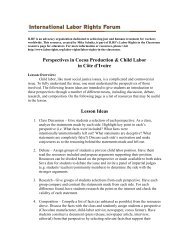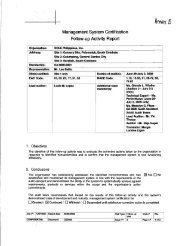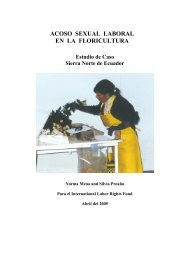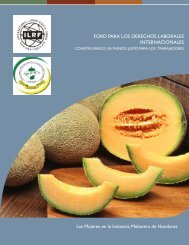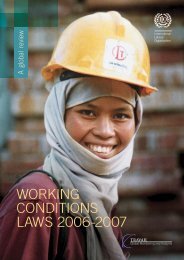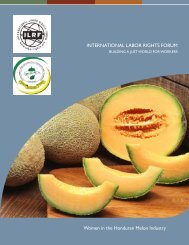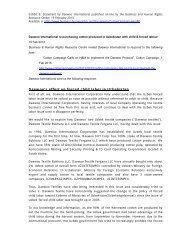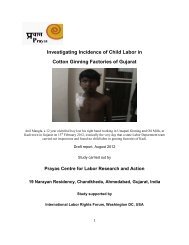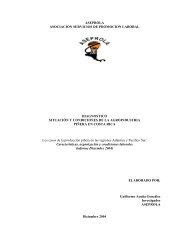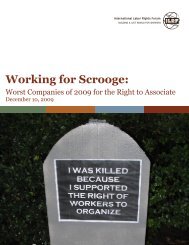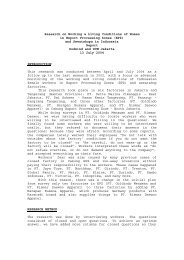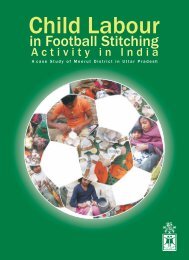Ethical Standards and Working Conditions in Wal-Mart's Supply Chain
Ethical Standards and Working Conditions in Wal-Mart's Supply Chain
Ethical Standards and Working Conditions in Wal-Mart's Supply Chain
You also want an ePaper? Increase the reach of your titles
YUMPU automatically turns print PDFs into web optimized ePapers that Google loves.
the cost of audit<strong>in</strong>g for all of the firms <strong>in</strong>volved. The GSCP is lauded by <strong>Wal</strong>-Mart <strong>and</strong> otherbus<strong>in</strong>ess ventures as a beneficial means to improve labor st<strong>and</strong>ards create a new efficiency <strong>and</strong>cut down on costs.<strong>Wal</strong>-Mart claims that “duplication of audits by different retailers <strong>and</strong> br<strong>and</strong>s also leads toconfusion on the part of factory managers” <strong>and</strong> those factories are suffer<strong>in</strong>g from “audit fatigue.”Through their program, audits will be conducted <strong>in</strong> a given factory <strong>and</strong> rated, then that rat<strong>in</strong>g willbe available to the companies that use that audited factory. For example, if Tesco audits FactoryX <strong>and</strong> gives it a Green rat<strong>in</strong>g, then <strong>Wal</strong>-Mart, who also uses Factory X, would not have toconduct an audit because it could use Tesco’s audit results. However, from the <strong>in</strong>formationdisclosed perta<strong>in</strong><strong>in</strong>g to the GSCP, it is difficult to determ<strong>in</strong>e what process <strong>Wal</strong>-Mart would takeif <strong>and</strong> when violations found <strong>in</strong> their factories are the result of another company’s audit.The fact that stakeholders were only <strong>in</strong>vited to jo<strong>in</strong> such a discussion of this new <strong>in</strong>itiative aftermuch of the orig<strong>in</strong>al <strong>in</strong>tent of the GSCP was determ<strong>in</strong>ed, suggests that there is no realcommitment on the part of bus<strong>in</strong>esses to <strong>in</strong>volve trade unions <strong>and</strong> labor rights NGOs <strong>in</strong> thedevelopment of this new program. Multi-stakeholder <strong>in</strong>volvement is an important part oflend<strong>in</strong>g any sort of credibility to this k<strong>in</strong>d of <strong>in</strong>itiative; <strong>in</strong>dependent advocates are needed toexpress the <strong>in</strong>terests <strong>and</strong> concerns of workers <strong>in</strong> ways that bus<strong>in</strong>esses <strong>and</strong> their suppliers cannot.However, to serve as a real participant <strong>in</strong> this program, a level of transparency is required that<strong>Wal</strong>-Mart <strong>and</strong> other companies are not prepared to give. The GSCP says that it wants to <strong>in</strong>cludestakeholders <strong>and</strong> will take their advice <strong>in</strong>to consideration, but it has already excluded suchgroups from the development of the <strong>in</strong>itial code of conduct.Companies with effective monitor<strong>in</strong>g programs, such as Nike, Gap, <strong>and</strong> Levi’s, areconspicuously absent from the GSCP. Both Nike <strong>and</strong> Levi’s list the names of their factories ontheir website as a m<strong>in</strong>imum recognition that factory disclosure is essential for supply cha<strong>in</strong>transparency. Information disclosure is an essential first step <strong>in</strong> committ<strong>in</strong>g to <strong>in</strong>dustry ‘bestpractices.’The GSCP could be a more credible <strong>and</strong> effective program if it exp<strong>and</strong>ed its focus <strong>and</strong> developedplans to <strong>in</strong>vestigate other issues such as the follow<strong>in</strong>g.(1) While most programs are geared towards workers <strong>in</strong> factory production, <strong>Wal</strong>-Mart’ssupply cha<strong>in</strong> also <strong>in</strong>volves those that participate <strong>in</strong> the food <strong>and</strong> agricultural sector.Labor rights <strong>and</strong> the code of conduct need to extend to these facilities where workers arefurther taken advantage of. Accord<strong>in</strong>g to <strong>Wal</strong>-Mart’s recent <strong>Ethical</strong> <strong>St<strong>and</strong>ards</strong> Programfact sheet, the “GSCP covers both food <strong>and</strong> non-food production for retailers <strong>and</strong> br<strong>and</strong>owners.” The GSCP should engage those work<strong>in</strong>g on labor rights <strong>in</strong> food <strong>and</strong> agriculturalproduction to capture the expertise of stakeholders as the GSCP moves forward.(2) <strong>Wal</strong>-Mart needs to make audit<strong>in</strong>g <strong>in</strong>formation <strong>and</strong> factory disclosure available tostakeholders <strong>in</strong> order for the <strong>in</strong>formation to be verified. NGOs <strong>and</strong> other <strong>in</strong>dependentworker advocates can be useful partners on this issue only if they are <strong>in</strong>formed <strong>and</strong> keptas part of the process.18



